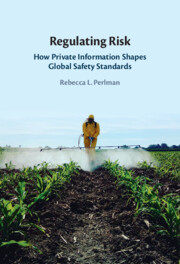Refine search
Actions for selected content:
23 results
Upholding humanity: The role of redress in preventing and responding to civilian harm
-
- Journal:
- International Review of the Red Cross , First View
- Published online by Cambridge University Press:
- 27 November 2025, pp. 1-34
-
- Article
-
- You have access
- Open access
- HTML
- Export citation
2 - Broken Contracts
-
- Book:
- Debts Unpaid
- Published online:
- 04 November 2025
- Print publication:
- 20 November 2025, pp 53-98
-
- Chapter
- Export citation
Sentience and Beyond—A Representative Interview With Peter Singer AI
-
- Journal:
- Cambridge Quarterly of Healthcare Ethics , First View
- Published online by Cambridge University Press:
- 13 January 2025, pp. 1-9
-
- Article
-
- You have access
- Open access
- HTML
- Export citation
7 - Conclusions and Outlook
-
- Book:
- Transformative Novel Technologies and Global Environmental Governance
- Published online:
- 24 August 2023
- Print publication:
- 07 September 2023, pp 204-232
-
- Chapter
- Export citation
3 - A Theory of Regulatory Barriers
-
- Book:
- Regulating Risk
- Published online:
- 23 March 2023
- Print publication:
- 30 March 2023, pp 53-73
-
- Chapter
- Export citation
1 - The Informational Origins of Regulatory Barriers
-
- Book:
- Regulating Risk
- Published online:
- 23 March 2023
- Print publication:
- 30 March 2023, pp 1-19
-
- Chapter
- Export citation
5 - How Precaution Begets Bias
-
- Book:
- Regulating Risk
- Published online:
- 23 March 2023
- Print publication:
- 30 March 2023, pp 101-136
-
- Chapter
- Export citation

Regulating Risk
- How Private Information Shapes Global Safety Standards
-
- Published online:
- 23 March 2023
- Print publication:
- 30 March 2023
‘For You Will (Still) Be Here Tomorrow’: The Many Lives of Intergenerational Equity
-
- Journal:
- Transnational Environmental Law / Volume 12 / Issue 1 / March 2023
- Published online by Cambridge University Press:
- 09 November 2022, pp. 121-149
-
- Article
-
- You have access
- Open access
- HTML
- Export citation
8 - Animals as Endangered Species
- from Part II - The Protection of Animals in International and Non-international Armed Conflicts
-
-
- Book:
- Animals in the International Law of Armed Conflict
- Published online:
- 06 October 2022
- Print publication:
- 06 October 2022, pp 129-149
-
- Chapter
- Export citation
4 - Investment Protection under International Humanitarian Law
- from Part II - Investment Protection and the Role of International Humanitarian Law
-
- Book:
- The Effects of Armed Conflict on Investment Treaties
- Published online:
- 11 August 2022
- Print publication:
- 25 August 2022, pp 101-114
-
- Chapter
- Export citation
Chapter 37 - Contraception and Drug Interaction
- from Section 3 - Contraception and Medical Conditions
-
-
- Book:
- Handbook of Contraception and Sexual Reproductive Healthcare
- Published online:
- 25 March 2022
- Print publication:
- 07 April 2022, pp 219-224
-
- Chapter
- Export citation
5 - Towards Ecological Security?
-
- Book:
- Ecological Security
- Published online:
- 10 September 2021
- Print publication:
- 23 September 2021, pp 167-192
-
- Chapter
- Export citation
7 - Environmental Stewardship between Consolidation and Contestation
- from Part II - History
-
- Book:
- Environmentalism and Global International Society
- Published online:
- 03 August 2021
- Print publication:
- 15 July 2021, pp 161-194
-
- Chapter
- Export citation
Chapter 3 - Breach of duty of care
-
- Book:
- Contemporary Australian Tort Law
- Published online:
- 20 January 2020
- Print publication:
- 15 October 2019, pp 98-148
-
- Chapter
- Export citation
Dynamic Benefit-Cost Analysis for Uncertain Futures
-
- Journal:
- Journal of Benefit-Cost Analysis / Volume 10 / Issue 2 / Summer 2019
- Published online by Cambridge University Press:
- 02 September 2019, pp. 206-225
-
- Article
-
- You have access
- Open access
- HTML
- Export citation
Research Ethics and Justice: The Case of Finland
-
- Journal:
- Cambridge Quarterly of Healthcare Ethics / Volume 28 / Issue 3 / July 2019
- Published online by Cambridge University Press:
- 12 July 2019, pp. 551-576
-
- Article
- Export citation
5 - International Law: Legal Norms, Principles, Custom, and Organizations
-
- Book:
- The Governance of Solar Geoengineering
- Published online:
- 11 June 2019
- Print publication:
- 23 May 2019, pp 71-91
-
- Chapter
- Export citation
Synthetic Biology and Ethics: Past, Present, and Future
-
- Journal:
- Cambridge Quarterly of Healthcare Ethics / Volume 26 / Issue 2 / April 2017
- Published online by Cambridge University Press:
- 31 March 2017, pp. 186-205
-
- Article
- Export citation
Protecting civilians in urban areas: A military perspective on the application of international humanitarian law
-
- Journal:
- International Review of the Red Cross / Volume 98 / Issue 901 / April 2016
- Published online by Cambridge University Press:
- 20 February 2017, pp. 177-199
- Print publication:
- April 2016
-
- Article
- Export citation
